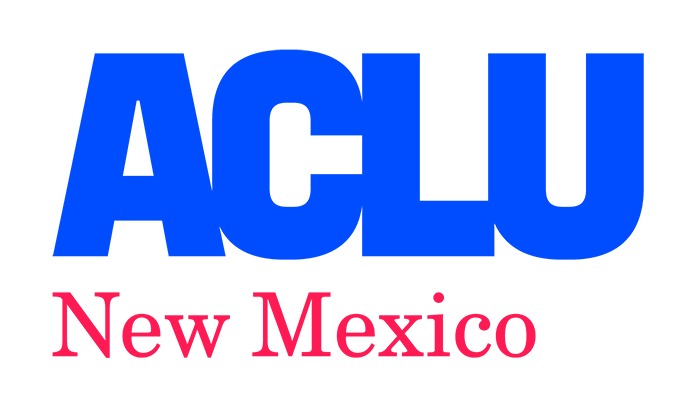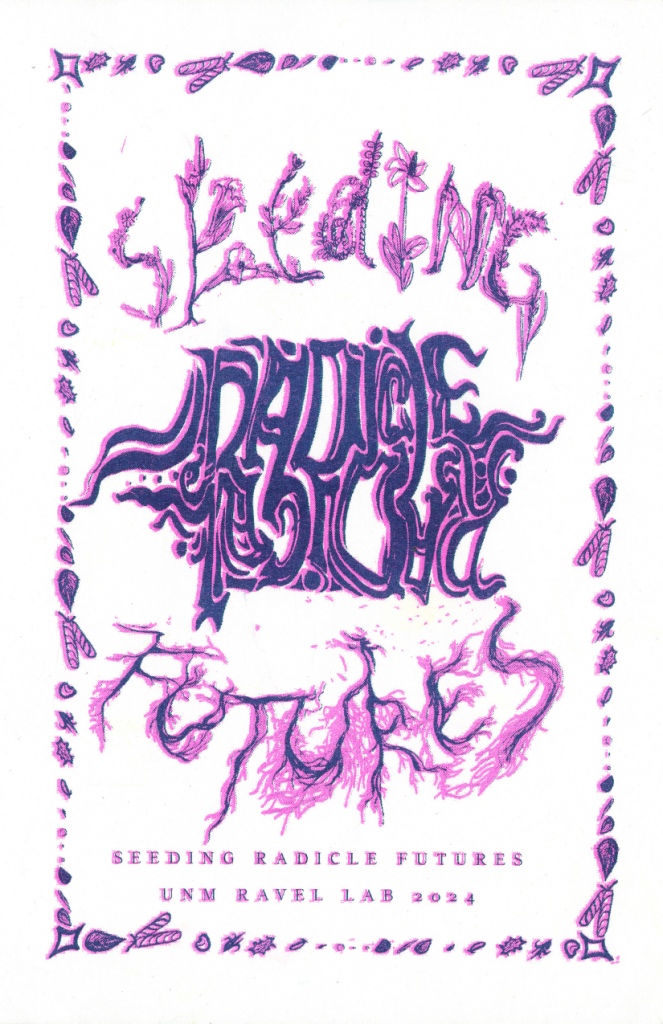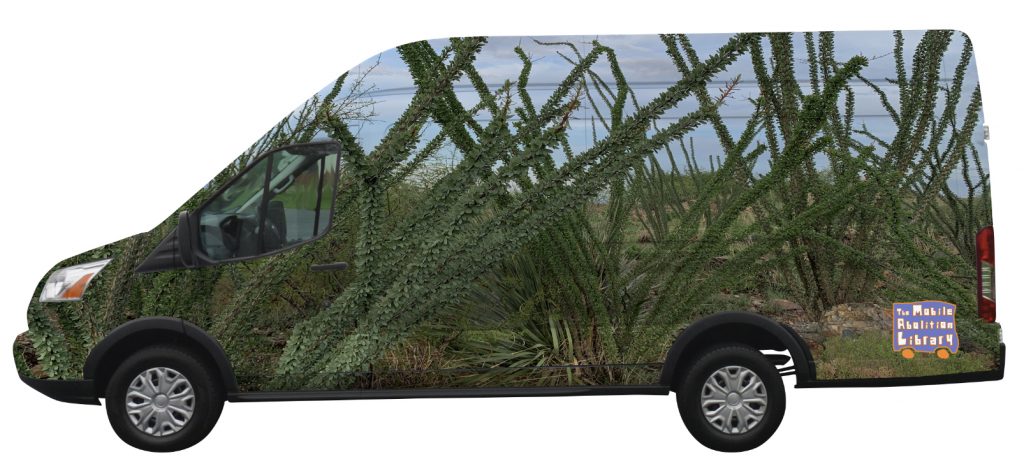
Upcoming dates:
Growing Justice and Migrant Literacy
May 17th 2-4pm
Rudolfo Anaya North Valley Library
7704-B 2nd NW
Albuquerque, NM 87107
NMSU, September 25.
Past Dates:
Monday, Feb 10, 2025 | 10:00 am – 12:00 pm | End Mass Incarceration Day at the Roundhouse
An ACLU gathering at the Roundhouse, to tell our lawmakers that we want treatment over punishment, resources for communities, not prisons, and alternatives to incarceration that keep families whole. This group of advocates is led by New Mexicans who have previously been incarcerated or whose family members currently are. We are demanding accountability and change that will make all New Mexicans safer and more prosperous.
New Mexico State Capitol (Roundhouse)
490 Old Santa Fe Trail
Santa Fe, NM 87501
Saturday, Feb 22, 2025 | 12:00 pm | Collaborative Filmmaking Workshop with Basement Films
Basement Films is collaborating with The Mobile Abolition Library and Marcella Ernest to offer a hands-on filmmaking workshop focused on community-based abolitionist futures art through predeveloped 16mm film, and sound at Working Classroom. This workshop is designed for POC, Black and Indigenous individuals from New Mexico, queer-identifying and non-gender conforming relatives, and allies, creating a space for collective creativity and expression. Participants will come together to produce visual art that reflects Queer Indigenous feminism, celebrating kinship, relationality, and inclusivity. The workshop offers an opportunity to engage in visual sovereignty, resist gender and sexual discrimination, and build community through collaborative art-making.
REGISTER HERE: https://forms.gle/3EA3HdcdE1ocZv7p8
Working Classroom
423 Atlantic Ave SW
Albuquerque, NM 87102
Thursday, Mar 29, 2025 | Community Day at the University of Arizona Museum of Art
Community Day in conduction with Hank Willis Thomas exhibition LOVERULES. The exhibition highlights several important series, including Branded and Unbranded: Reflections in Black by Corporate America. In Branded, Thomas explores and re-contextualizes the history of brand advertising and sponsorship through the iconography of sport. In Unbranded, Thomas digitally removes advertising punchlines and logos, with both series thereby highlighting the consistently dehumanizing strategies of corporate media, the commodification of African-American identity, and how dominant cultural tropes shape notions of race and race relations.
University of Arizona Museum of Art
1031 North Olive Road
Tucson, AZ 85719
SITE Santa Fe – October 19th, November 16th and January 18th
The events at Site Santa Fe, we are hosting a book club. On the above dates we will be collectively discussing Normal Life, by Dean Spade. The following is are discussion schedule!
Saturday, Oct 19, 2024 | 10:00–11:30 AM: Book Club meeting will focus on Chapters 1, “Trans Law and Politics on a Neoliberal Landscape,” and Chapter 2, “What’s Wrong with Rights?”
Saturday, Nov 16, 2024 | 10:00–11:30 AM: Book Club meeting will focus on Chapters 3, “Rethinking Transphobia and Power, Beyond a Rights Framework” and Chapter 4, “Administrating Gender.”
Saturday, Jan 18, 2025 | 10:00–11:30 AM: Book Club meeting will focus on Chapters 5, “Law Reform and Movement Building.”
Jean Cocteau Cinema, Santa Fe – December 7th 12-4pm
ABOUT
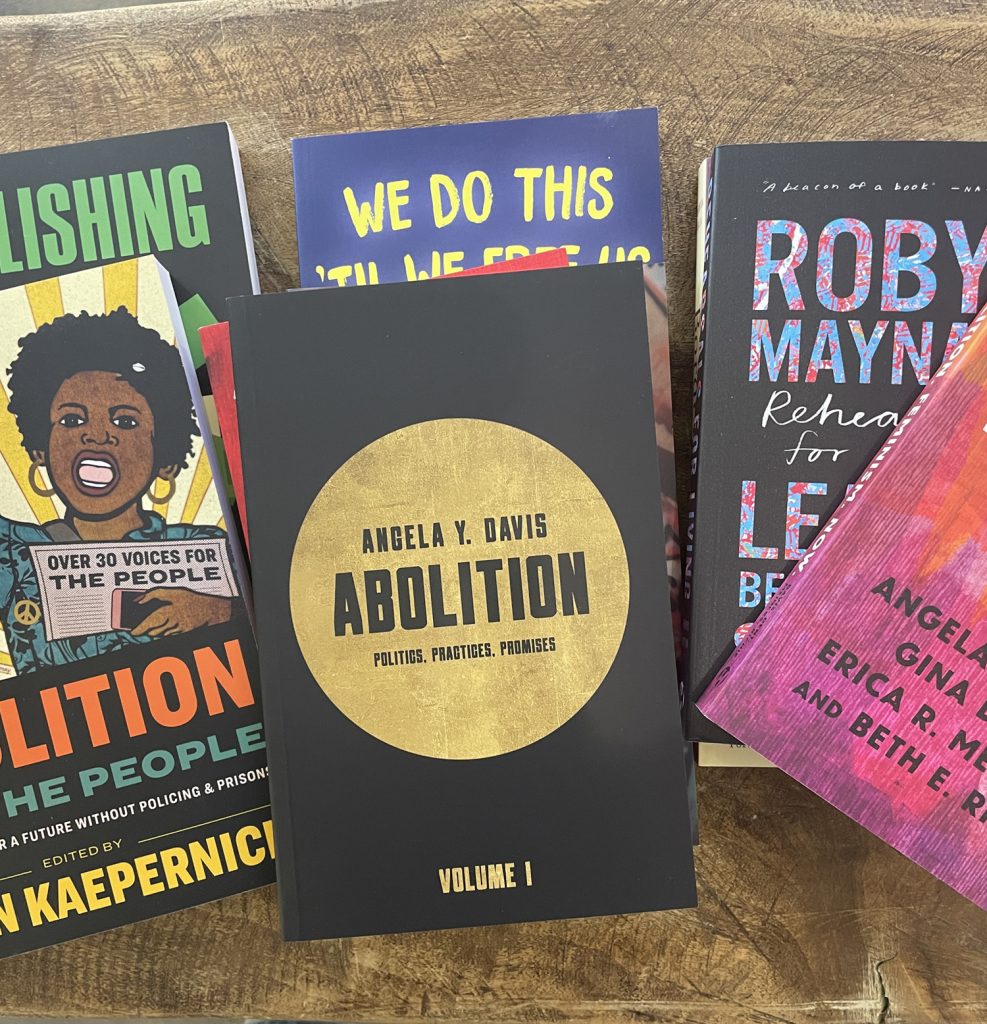
The Mobile Abolition Library is a visual arts and literacy initiative grounded in an abolitionist framework. The mobile collection and its programming is centered in challenging the systems of surveillance, policing, punishment, and community care. The intention is to be a community-driven project that raises awareness, inspires critical thinking, and fosters discussions about incarceration’s impact on communities.
The project is a collaboration between sheri crider of the Sanitary Tortilla Factory and Bernadine Hernandez + Martìn Wannam of the Fronteristxs collective. sheri designed and built out the van including the interactive displays and exterior wrap. Additional contributing artists include Delilah Montoya (exterior photo for wrap), John-Mark Collins (coding for interactive screens) and Kaitlin Bryson (first seed library artist). Contributing organizations include Bookworks, ACLUNM and A Good Sign.
The library houses a collection of over 300 books, zines, seed library and portrait archive. The materials in the collection cover topics related to abolition, social justice, and community care. The library emphasizes grassroots and alternative methods to re-imagine the possibility of transforming criminal justice to envision and create a more equitable and sustainable future.
DONATE BOOKS TO THE LIBRARY HERE
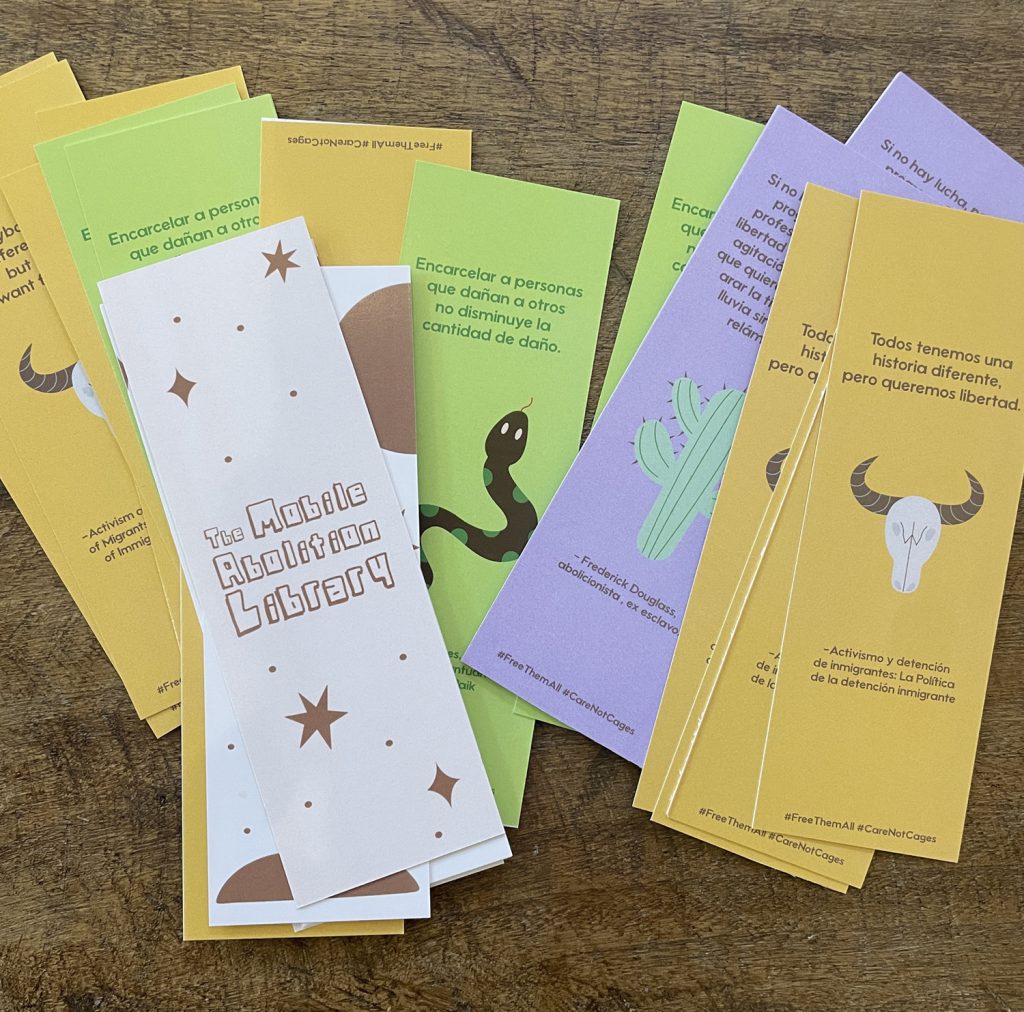
We accept NEW and USED books!! In the spirit of generosity and abolition, we hope to have multiple copies of books to leave with readers and communities. We are so grateful to Bookworks one of Albuquerque’s last remaining local, independent bookstores is our incredible local partner hosting the book drive to community source the physical books for the library. Authors, book lovers, Abolitionists world wide are encouraged to purchase the books for the traveling library. Click here to purchase books and become a supporter of this project, we also accept used books. Find our complete book list here.
ADD TO THE JUSTICE IMPACTED ARCHIVE HERE
JUSTICE IMPACTED PORTRAIT ARCHIVE is a collection of personal stories directly impacted by mass incarceration. The portrait series is an ongoing project created by sheri crider. You can contribute to the archive HERE.


Receive a 12″x18″ portrait for participating!
ADD TO THE MIGRANT LITERACY PROJECT HERE
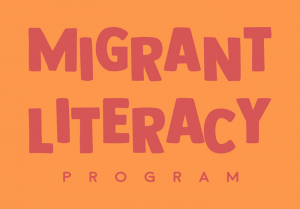
The Migrant Literacy Project (MLP) teaches multi-generational literacy through border, migration, and movement narratives in English and Spanish, while documenting written and oral migrant border stories for each local community library archive. The MLP is participatory and multi-generational in its design, focusing not on institutional or formal reading and writing practices but, instead, on oral community storytelling, collaborative discussions, letter writing, and crafting of participant narratives through multi-modal media forms. The outcome of planned face-to-face workshops is increased community literacy. collaborates with community libraries throughout New Mexico and hopes to expand throughout the US. In densely Spanish-speaking regions, migrant populations will collaborate with local community librarians. Participants will also receive a free 12″ x 18″ portrait.
ABOLITION SEED LIBRARY
Seeding Radicle Futures partnered with the Mobile Abolition Library, the Institute of Applied Ecology (IAE) and the Southwest Seed Partnership (SSP) program to create a Mobile Abolition Seed Library. The seed library complements the traveling literary collection, community engagement programming and supports the project’s ongoing grassroots actions to encourage advocacy for abolition through food sovereignty, seed justice and accessibility, and habitat restoration through the circulation and growth of native seeds. The seed collection prioritize’s native seeds and their situated/place-based knowledges to foster community-driven resilience.
Climate Resilience and Mass Incarceration Program
A workshop created by the Southwest Seed Partnership/Institute for Applied Ecology- in partnership with RAVEL Lab and the Mobile Abolition Library. Led by sheri crider and an arts and Ecology practitioner, the workshop is focused on an introduction to the connections between climate change and mass incarceration. The workshop identifies seeds and methods to contribute to climate resilience. Participants learn the preservation practice of making seed balls and best practices for selection of planting for climate resilience. Participants learn more about the dehumanizing effects of incarceration, including lack of outdoor access, healthy food and paths to Re-entry. Participants learn how they can catalyze changes in their community.
The Seed Library focuses on promoting sustainable practices and community resilience. The seed library focuses on seeds centered on food and climate resilience for each region that the library visits. We believe that land based practices are central to transforming criminal justice. Our first edition of the Mobile Abolition seeds available were designed and thoughtfully selected by Kaitlin Bryson.
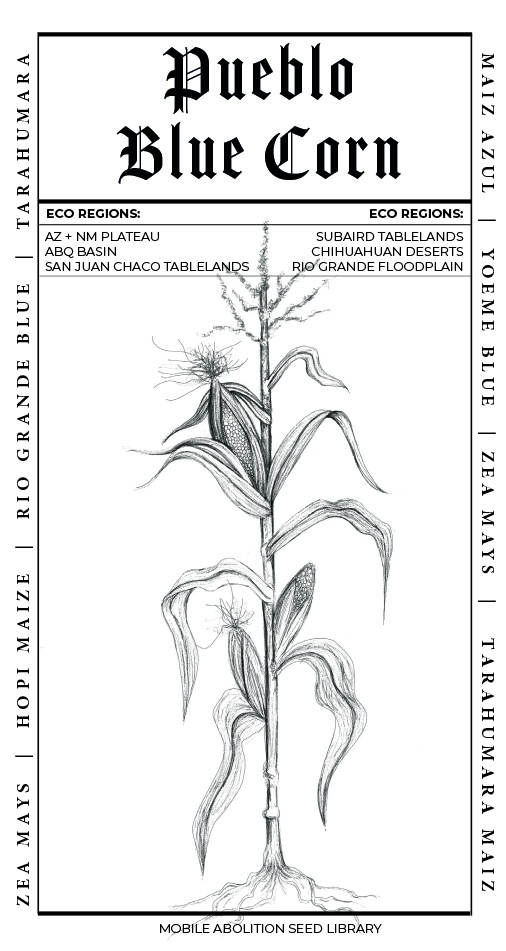
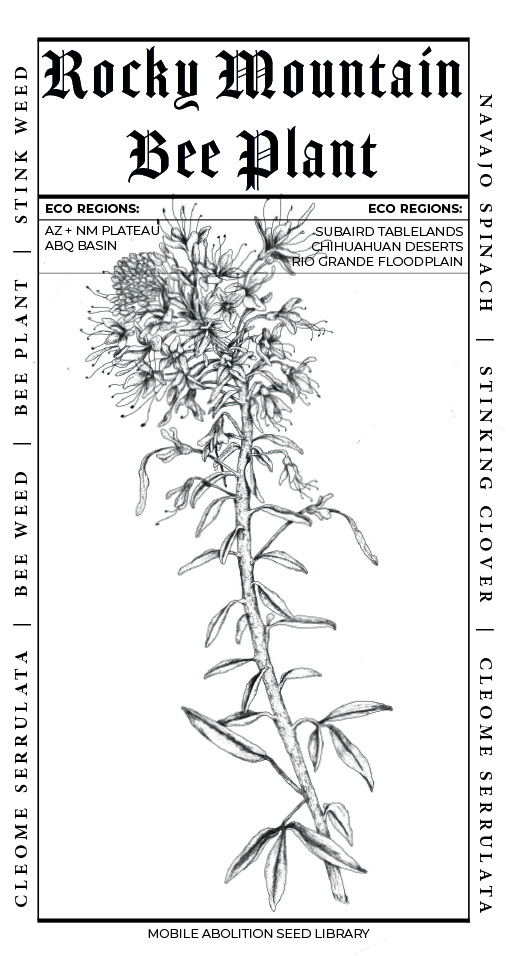
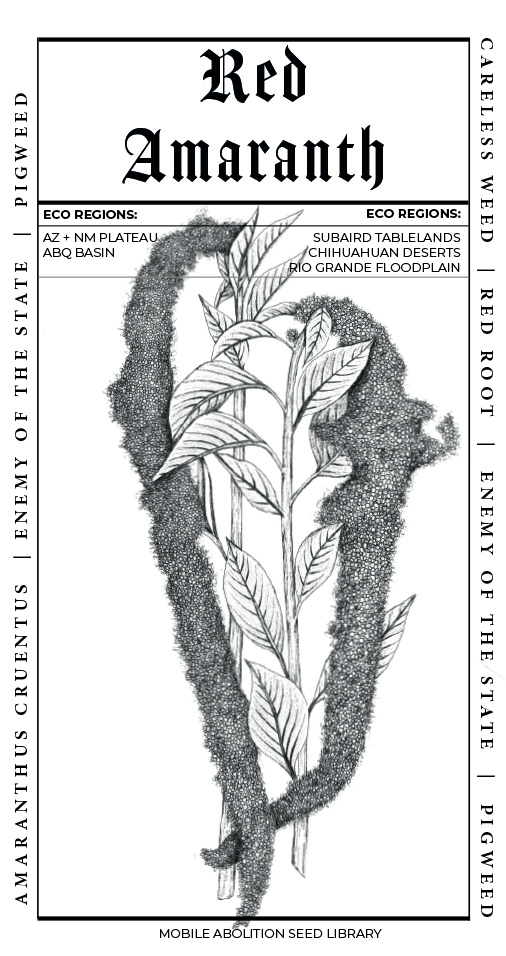
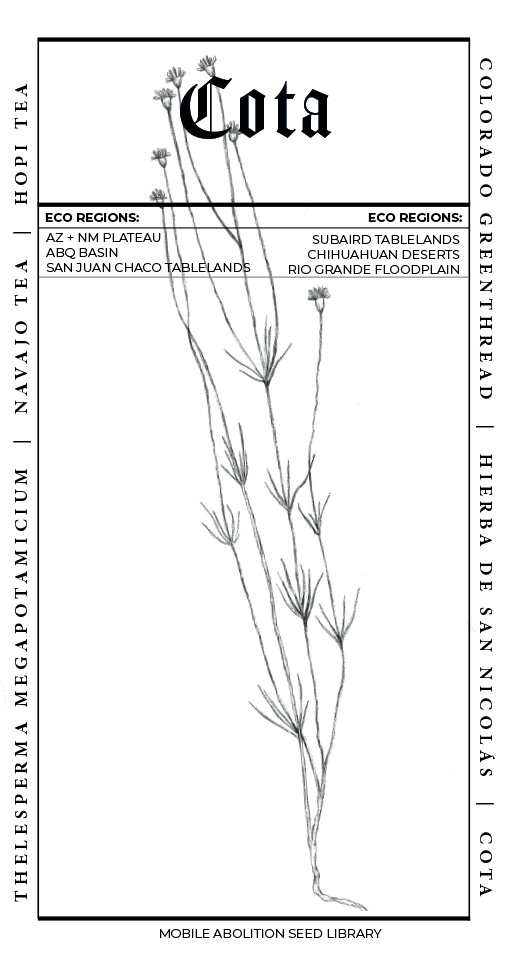
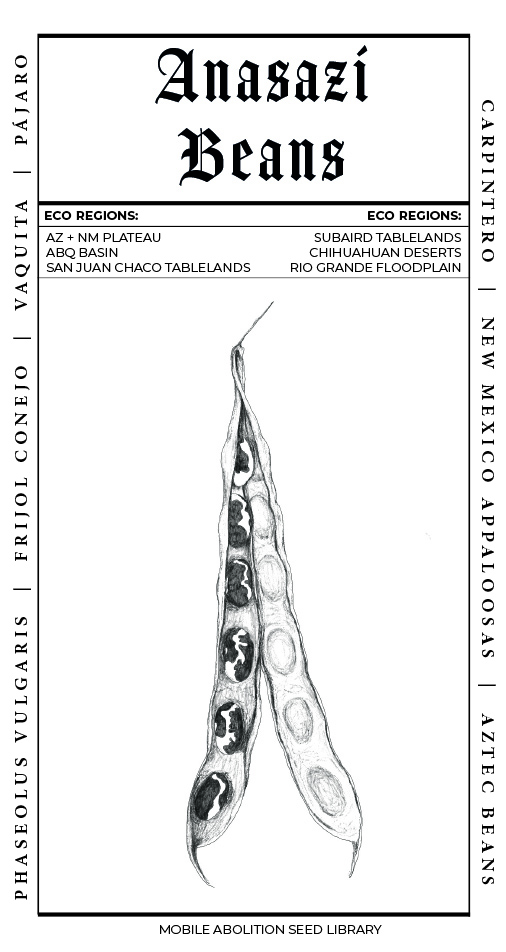
First edition of the Mobile Abolition seeds designed and thoughtfully selected by Kaitlin Bryson.
Last December, we launched the seed library in the Mobile Abolition Library. The TRAVEL PLAN is set to visit various locations in New Mexico and the US over the next three years. This includes community and library spaces, communities directly surrounding migrant detention centers and prisons. Additionally the mobile library will visit book stores, art museums and spaces that create space for critical dialogue.
ADDITIONAL EXHIBITIONS include travel to key museum and art exhibitions throughout the state and leverages the intersection between art and activism.
FOR MORE INFO:
PHONE (505) 228-3749 OR EMAIL abolitionlibrary@gmail.com
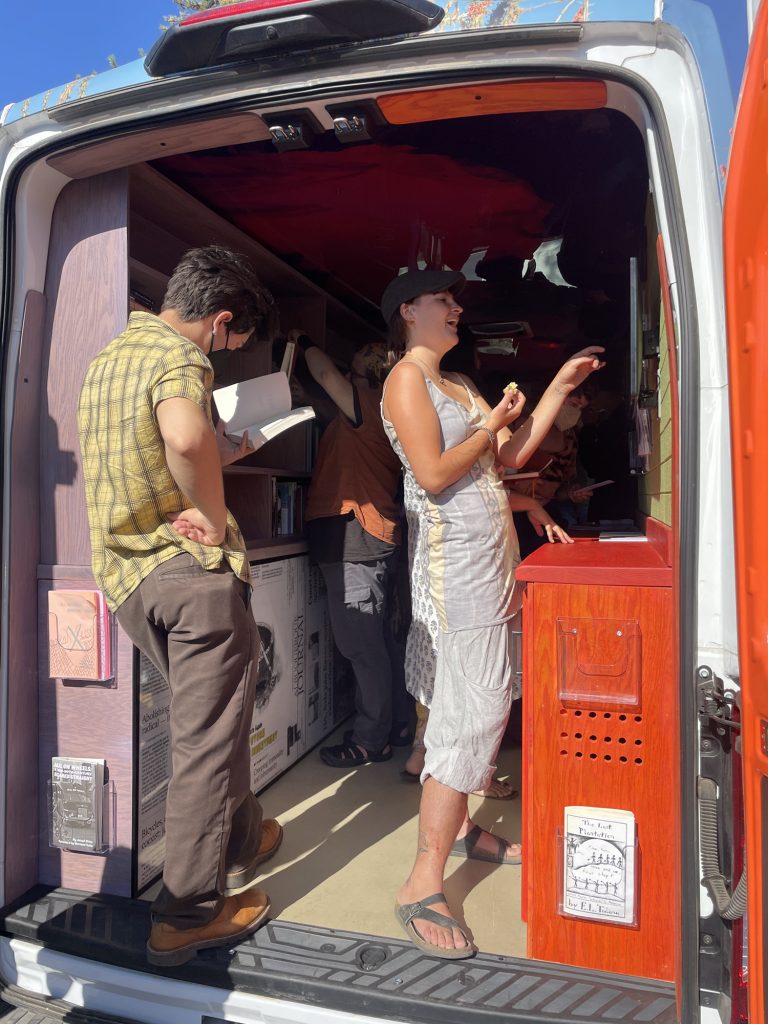
Thank you to our partners and supporters!


